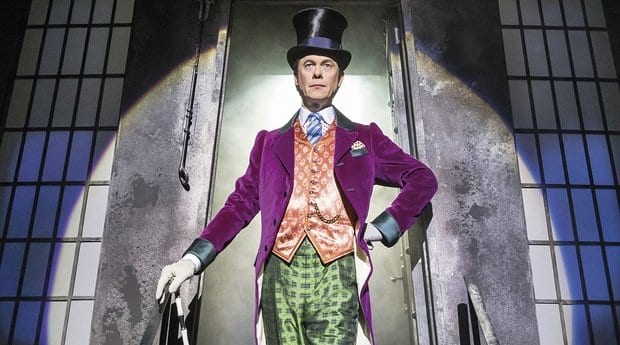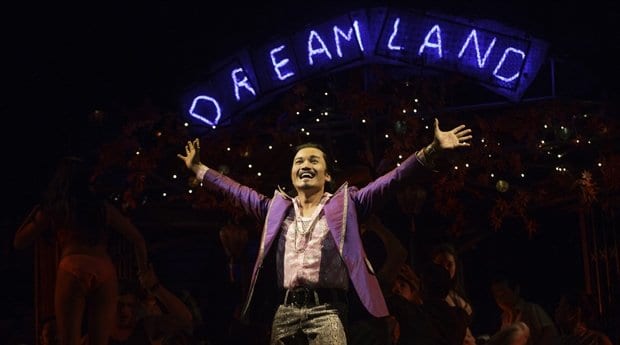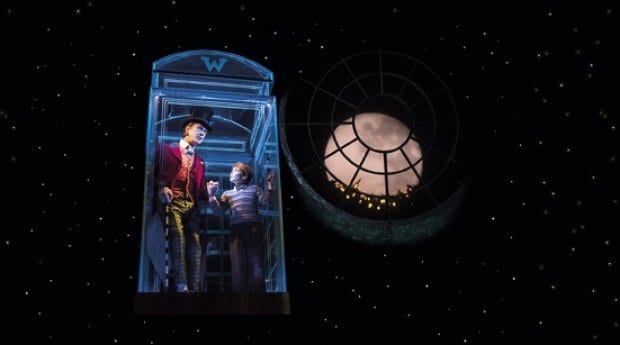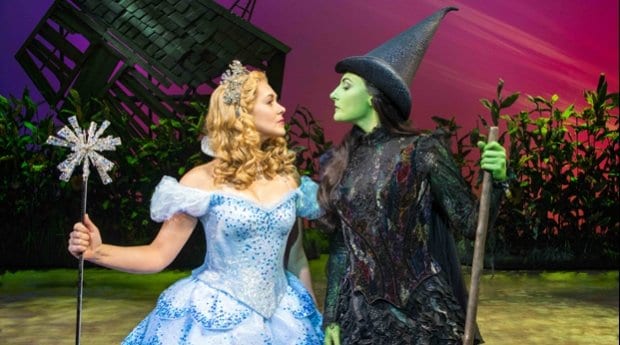
Charlie and the Chocolate Factory. Credit: charlieandthechocolatefactory.com

Jon Jon Briones as The Engineer in Miss Saigon. Credit: Matthew Murphy

Charlie and the Chocolate Factory. Credit: charlieandthechocolatefactory.com
As home to some of history’s most revered playwrights — William Shakespeare, George Bernard Shaw, Oscar Wilde — it should come as no surprise that Old Blighty’s capital boasts an impressive theatre scene. North Americans might be spoiled for choice, with Toronto’s theatre district and New York City’s Broadway, but London theatre promoter Jonathan Mountford says his home impresses in its own distinct way, justifying the trans-Atlantic trip for theatre buffs.
“London’s West End has always been and continues to be the world centre for theatrical excellence,” Mountford says. “The standard of theatre is high, given the massive pool of producers that are eagerly queuing up to get their work into a venue to replace a struggling show, and London’s well-versed audiences are always looking for something new and exciting.”
Mountford’s passion for theatre is evident. As he describes the scene and what’s hot onstage, a deep smile forms. He rubs his palms and his heel begins to tap beneath the table. He says London’s ideal combination of talent supply, audience standards and history make the city “the hands-down best place to create new work and revive classics.”
Classics onstage in the West End — the nucleus of London’s theatre scene — include The Phantom of the Opera, Les Misérables and The Mousetrap, which have been attracting a stream of theatregoers for decades.
New works help to mix up the London theatre offer. The Bodyguard, a musical adaptation of the famous Whitney Houston flick, stormed onto the Adelphi Theatre stage in late 2012 and has been impressing audiences ever since. Updated choreography, song performance and additional Houston hits give the production a modern feel without upstaging the vacillating love story between megastar Rachel Marron and her bodyguard, Frank Farmer.
Musical adaptations of Roald Dahl’s Matilda and Charlie and the Chocolate Factory have quickly become big hits for families and children at heart. Matilda impresses with eye-popping sets and a talented cast of youth, but centre-stage is the evil head mistress, Miss Trunchbull, played as hideously wicked as her chin mole by Montrealer Alex Gaumond in drag.
Despite the absence of a big gay production in the West End since Priscilla, Queen of the Desert, which closed in 2011 after a three-year run at the Palace Theatre, Mountford insists there is still plenty for a gay audience. He points to Miss Saigon, which opened this spring in London.
“Any play or musical that deals with the idea of repression or a hidden secret seems to relate strongly to a gay audience,” he says. “Miss Saigon, for instance, tells the story of forbidden love and the battle for the right to love anyone you choose — a right the gay community is still fighting for.”
Theatre critic and blogger Scott Matthewman agrees that the post-Priscilla scene resonates for gay audiences. “Wicked, for example, has a huge gay following, partly because it features two divas but also because it’s a story about accepting difference,” he says. “So it doesn’t have to be a great gay show; it can be just a great show to make that connection with a gay audience.
“In so much of theatre, you bring your own experiences to it, and there are elements of a play that will resonate with you as a gay person rather than a person next to you based on what you’ve been through in your life,” he says.
Matthewman attributes the quality of London theatre to its breadth. While the West End is the focal point for tourists, there are also fringe, off-West End and repertory theatres like Shakespeare’s Globe. “The one thing that characterizes the London theatre scene is the size of it. The West End is massive, but all over London there are lots of theatre spaces producing really great stuff,” he says.
“Also, the lines between West End and off-West End are blurred because some playhouses are just as big as West End theatres. If you go further afield, you can see something just as good in a more intimate setting for less money and have a great night out.”
Above the Stag Theatre sustains itself by catering specifically to the gay market with queer productions, from dramas to comedies to pantomimes. “We are the only full-time professional LGBT theatre in the UK,” artistic director Peter Bull says. “We are primarily a producing house, although we occasionally welcome visiting productions.
“The most important people at our theatre are the audience,” he says. “We must give them what they want, which is to be entertained. That doesn’t mean we can’t present something controversial or challenging, but it must be of a high standard.” The company’s summer show is a revival of Bathhouse: The Musical, which, Bull says, “doesn’t pretend to be high art, but is just a feel-good summer audience pleaser.”
In a city that sets such a high standard for theatre, paying attention to audience response is critical; Londoners value steak over sizzle. Remember that this is where Andrew Lloyd Webber’s highly anticipated 2011 Phantom sequel, Love Never Dies, was coined “Paint Never Dries” and closed within 18 months. And Viva Forever, the super-hyped 2012 Spice Girl musical, closed within seven. Meanwhile, on Broadway, musicals like Spider-Man: Turn Off the Dark will blunder along filling seats despite negative reviews.
Londoners, Bull notes, are not easily impressed. “We tend not to applaud the scenery and every entrance, which seems to happen whenever I see a Broadway show.”
Even when their stages are empty, London’s theatres are noteworthy attractions. Walking tours by the Society of London Theatre weave through the theatre areas of Soho, Covent Garden and the Strand, highlighting the architecture and personalities behind all sorts of theatres, from Victorian to modern. Some, like Drury Lane and the National Theatre, also offer backstage tours.
For the most up-to-date travel information on gay London, see our City Guide, Listings Guide, Events Guide and Activities Guide.
For more on theatre in London, visit the London Theatre Directory.
For more on London or Britain travel, go to VisitBritain.

 Why you can trust Xtra
Why you can trust Xtra